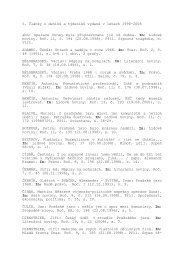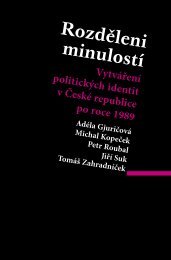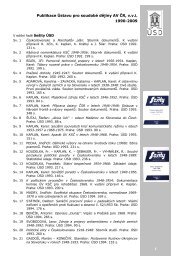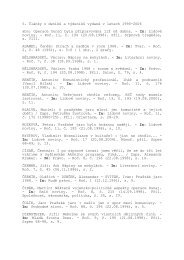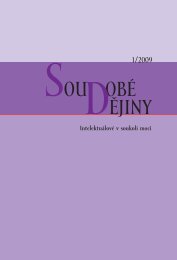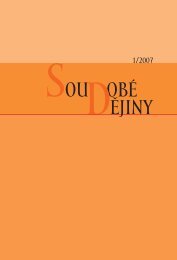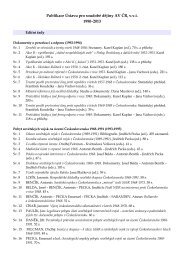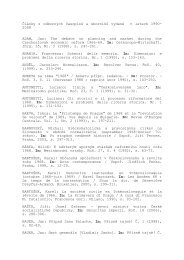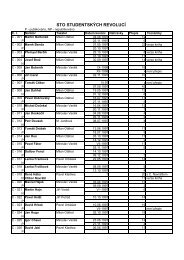SOU OBà ÄJINY - Ãstav pro soudobé dÄjiny AV - Akademie vÄd ÄR
SOU OBà ÄJINY - Ãstav pro soudobé dÄjiny AV - Akademie vÄd ÄR
SOU OBà ÄJINY - Ãstav pro soudobé dÄjiny AV - Akademie vÄd ÄR
You also want an ePaper? Increase the reach of your titles
YUMPU automatically turns print PDFs into web optimized ePapers that Google loves.
520 Soudobé dějiny XVI / 2–3<br />
The author puts the Talich case into the broader context of the post-war settling<br />
of scores with real or imagined henchmen and sympathizers of the German<br />
forces of occupation. He considers the character of the people forming the moral<br />
judgements, by examining their attitudes towards Communism and its desired<br />
dictatorship of the <strong>pro</strong>letariat and class struggle. Particularly Nejedlý, who<br />
repeatedly criticized Talich publicly after the war, and did not try to understand<br />
the motives behind his behaviour in the Protectorate, showed very little courage<br />
when standing face to face with Stalinist repression. On the whole, however, it is<br />
fair to say that the politicians involved (including President Edvard Beneš) showed<br />
considerable restraint in the Talich case, and made it possible to investigate<br />
his war-time behaviour thoroughly according to the law. The author rejects as<br />
simplistic the conclusions that clearly place the blame on Talich or other artists<br />
working in the Protectorate or, on the contrary, present these people as blameless<br />
victims of attacks by their enemies. Every life story is individual, the author argues,<br />
each episode must be judged in its historical context. Respect for Talich’s art and<br />
talent will not diminish, if we concede that during the Second World War he had to<br />
make com<strong>pro</strong>mises resulting from Nazi pressure, his own doubts, or simply fatigue<br />
and having grown accustomed to the reality of Protectorate life.<br />
Political Games with the ‘Unfinished Revolution’: Settling Accounts<br />
with Communism during and after the Civic Forum, 1989–92<br />
Jiří Suk<br />
This article discusses the birth and early dynamics of Czech post-Communist<br />
anti-Communism. It is based on the recognition that during the political takeover<br />
in November and December 1989 the policy of radical discontinuity remained<br />
a marginal, practically invisible and inaudible phenomenon in the mostly restful<br />
period of civil unrest. In the generally shared atmosphere of ‘national understanding’,<br />
which led to the historic com<strong>pro</strong>mise between the old, Socialist régime and the new,<br />
democratic régime, there was no room for a policy of radically settling scores with<br />
the Communist Party and the past. It was all the more surprising, therefore, when<br />
demands along these lines (the relinquishing of Party <strong>pro</strong>perty, the outlawing of the<br />
Party, the punishment of criminal and treasonous politicians) appeared as if out<br />
of nowhere as early as the beginning of 1990, and then intensified. Memory was<br />
awakened and its numerous previously buried levels now emerged in public life. The<br />
incursion of the dark, unrecognized, and un<strong>pro</strong>cessed past into the artificial reality<br />
of historic com<strong>pro</strong>mise caused frustration with ethics in the ranks of the nascent<br />
political élite. It was but a small step from the political prisoners’ awakened memories<br />
of crimes committed by the recently defeated régime to the now current <strong>pro</strong>blems<br />
with the ‘nomenclature brotherhoods’ and ‘Communist mafias’ in the <strong>pro</strong>vinces and<br />
in businesses throughout the country. Calls for a thorough settling of scores were<br />
heard with increasing frequency from Civic Forum (Občanské fórum), the victorious



